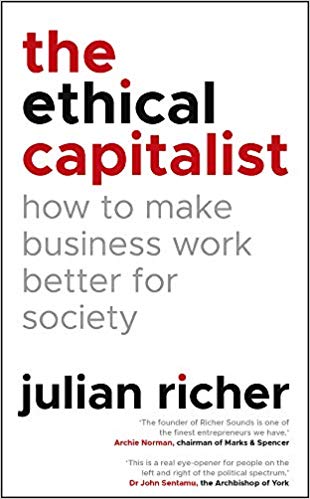Georgina Bishop: “The Ethical Capitalist” by Julian Richer

As an economic system, unfettered capitalism in the post-recession era has come under considerable scrutiny. Reports of business scandals and misdealings, as well as serious social inequalities, are but a few of the most cited examples. In the face of these criticisms, proponents of capitalism have come to its defence. In “The Ethical Capitalist”, entrepreneur Julian Richer joins these proponents, arguing not only that capitalism is the only viable option but also that, when pursued responsibly, it is a force for good.
The founder and owner of the remarkably successful home entertainment retailer Richer Sounds, the author is five times winner of the Which? ‘retailer of the year’ award. He has been an active supporter of the National Living Wage and has taken up the mantel against tax avoidance and in relation to the housing crisis but he maintains that capitalism can be practiced ethically.
Building on over forty years of business experience, Richer begins his book by setting out his understanding of ‘ethics.’ At this point, the reader might be forgiven for any scepticism towards his somewhat simplistic definitions which often revert to rather superficial ideas of what it means to be ethical – as well as quoting mantras such as ‘what goes around comes around’ and you ‘get nowt for nowt’ (page 29).
However, as Richer really gets going with his practical applications, we start to realise that he may just have some valid points. In the first part of the book, he explains how the ethical business should treat its key players – employees, customers and suppliers. Chapter 1 draws into focus the importance of company culture, revealing how costly practices such as employee fraud, theft and absenteeism are often learnt behaviours from management. Being ethical, therefore, involves actively pursuing a positive work culture, starting at the beginning of the hiring process with honest job adverts, which attract the right candidates. Imploring businesses to follow through with prioritising internal promotions, paying a Living Wage and providing ongoing training opportunities, he makes it clear that this is not simply an optimistic vison for business altruism. By changing the way in which a business relates to its employees, it will minimise the cost of high staff turnover and this can only be positive for profitable success.
Chapters 2 and 3 make a similar case for a more ethical approach towards customers, suppliers and supporters. The overall message is that reputation is critical, in so much as it encourages repeat custom and builds crucial relationships. At times, the examples Richer includes from his own business can almost appear too saccharine, such as the time he delivered flowers to the home of a woman after a poor customer service experience.
Some may also challenge his assumption that customers are always concerned about a company’s conduct, more so than lower prices. Could it be that consumer consciousness of certain issues is only significant in periods of high media attention? Nevertheless, businesses are indeed playing a very short-sighted game when they prioritise crisis management over risk management, in a world of increasing consumer savviness and a ruthless social media scene.
In the second part of the book, Richer goes on to tackle capitalism itself, recommending points of reform and highlighting areas where limitation is both intentional and desirable. In chapter four he demonstrates the compatibility of capitalism and the principle of a National Living Wage. Using both national and international examples, Richer argues that higher wages have not automatically equated to fewer jobs. Instead, they improve a company’s reputation, which in turn boosts profitability. The wage-profitability relationship will no doubt be a contentious issue for many readers.
Richer further argues that we need to name and shame those companies which continue to resist it. Again, the assumption that reputation is a make or break factor in consumer decisions underpins his arguments, but he does provide empirical evidence to support his view.
In chapter 5, Richer critiques Thatcherite individualism, arguing that society is very much a reality. Often conveniently forgotten is that government is essential for business, not least because it provides the very environment required for it to thrive. He argues that nobody is entirely ‘self-made’ and we’re called to consider, who runs the banking system necessary for transactions, creates the laws under which businesses operate and maintains the infrastructure which holds everything together? Here too it is suggested that naming and shaming those who purposefully avoid paying their taxes would be effective, drawing on the Scandinavian model as an example. What exactly Richer views as ‘purposefully avoiding taxes’ could benefit from a more detailed discussion.
Taken from a simple game theory perspective, one might reason that it would require more than this to produce change. Businesses may very well take the view that they can ride out an unpopular image if their product or service is valued highly enough and therefore refuse to be the first in their industry to reform. Nevertheless, if we accept that consumers are becoming ever-more discerning, Richer is right to assert that capitalism doesn’t have to equal the eradication of civil society.
Finally, in chapter 6, we are cautioned that the principles of the free market cannot and should not be applied everywhere. Using privately run prisons as a key example, Richer instead focuses on the separation between ownership and management. Whilst this is perhaps the hardest of his arguments to follow, as it is unclear where exactly we should draw the line, separating complex social needs from simplistic market equations is a refreshing message from a believer in capitalism, who recognises that it need not be all or nothing.
Richer leaves business owners with the charge to get started somewhere in making a difference – and he’s provided plenty of examples and inspiration throughout his book to get them going. Despite possible criticism that his ideas rest upon certain assumptions about motivation for human behaviour, his argument that treating people well is not only admirable but also good for business, is compelling, well-evidenced and convincingly nuanced.
“The Ethical Capitalist” by Julian Richer was published in 2018 by Random House (ISBN-13: 978-1847942197). 192pp.
 Georgina Bishop is Senior Editorial Assistant within the Social Sciences at Routledge. She obtained her BA in History and Politics from the University of Nottingham in 2016.
Georgina Bishop is Senior Editorial Assistant within the Social Sciences at Routledge. She obtained her BA in History and Politics from the University of Nottingham in 2016.
